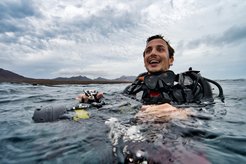Sailing in Darwin's wake
Eduardo Sampaio sailed for ten days along a section of the route of the MS Beagle
On 12 February 2022, Charles Darwin would have been 213 years old. In honour of the British naturalist, the international Darwin Day will be celebrated worldwide. One person who recently followed in Darwin's footsteps is Eduardo Sampaio from the MPI of Animal Behavior in Constance. He spent ten days on board the Captain Darwin in the waters off Cape Verde – almost 200 years after Charles Darwin visited the islands off the West African coast.

What did it feel like sailing in Darwin’s footsteps?
I really felt a bit like him. I was reading “The origin of species” by Darwin on our trip. I had never read the book itself, so I took the opportunity. Although we weren't in the replica of the vehicle, the fact that we didn't have Internet and most of the electronics were very conditioned to the electricity that we had, we almost had the same level of the technology, and at least of social interaction with other people.
The Captain Darwin set sail in September 2021 – for a four-year expedition. You spent 10 days on the sailing boat. Can you tell me a bit more about the project?
The project was brought to my attention by the French film maker Victor Rault, who initiated the project. He was reading Darwin’s book “The Voyage of the Beagle” and felt like this was a perfect expedition to redo. He wants to find out how ecosystems worldwide have changed since Darwin's time and, where possible, give an outlook on the future: Where are we heading in the face of advancing climate change? The 12-metre sailing boat takes the same route as the HMS Beagle did back then. At the various stations on the journey, Victor meets scientists who are researching the same organisms as Darwin once did.
You are one of those scientists …

Yes, I had done some research on octopuses in Cape Verde before. When Darwin was in Cape Verde he mentioned the surprising defense mechanisms of octopuses and cuttlefish, and how different they are from the rest of the animal kingdom. Victor invited me to do more work on the natural history of the octopus in Cape Verde because of that. So his idea is not only to document how the ecosystem changed, but also to help scientists that work on these topics to further their research as well.
What changed since Darwin and its abundance in the ecosystem of Cape Verde?
There's fishing pressure in this area nowadays. Although they're natural reserves, some fishermen from nearby islands come and use the octopuses as bait. But at the same time there is a lack of large predators, because they are fished by the fishermen. So, basically, it's a very loose inference that you can extrapolate from. But I would say that the population is kind of the same. In contrast to overfished areas like Israel for example, perhaps you don’t see the octopuses in Cabo Verde hunt because there are still predators – although not as much as when Darwin was there.
Wild Octopus aggressively reacts to mirror
What was your life and work on the research ship like?
What I miss the most is waking up at 6:00h in the morning, eating something and drinking a hot coffee, while watching the sunrise – with the deserted islands on the background. Afterwards we would do one or two dives. The crew consisted of four people. Victor was the captain and the film maker at the same time. He's a big sailor and diver as well. Martin was the main sailor. And Nico was the dive officer, so he would plan the dives. I was the scientist on board. Each of us had different responsibilities, which made for a well-coordinated team. The biggest advantage of doing research on a small boat like Captain Darwin is that you can take sample even in very remote locations. You’re much more mobile than in a great scientific boat. A great experience – thanks to Darwin.
Will you use the data collected on your trip with Captain Darwin for your further research?
Yes, we did the mirror experiment. It was the first experiment in the field to find out if octopuses react to mirrors. There's no scientific paper yet that actually says that they do so. They could also just ignore the mirror. Their eyes are similar to ours. But we weren't sure if they would catch the reflection and would recognize another octopus or themselves. So this is basically a build up to test self-recognition of octopuses. We verified that they do this in a natural environment. So even if we do this in the lab, we're not coercing them. And we're not changing their natural behaviour.
The interview was conducted by Petra Maass














